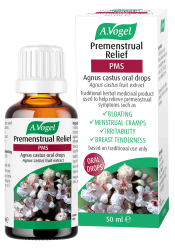An introduction to nausea and PMS
Nausea may not be the most common symptom of PMS but it can be highly unpleasant and unsettling.
Feeling nauseated can lead to a loss of appetite as well as make it more difficult for you to concentrate on normal daily activities. Some women may also be prone to vomiting as a result of severe nausea.
Nausea during PMS may sometimes be mistaken as a sign of pregnancy and hence, can be a disconcerting symptom. However, unlike this state of affairs, PMS nausea occurs monthly just before a period and disappears once menstrual bleeding starts.
Why does PMS cause nausea?
There are several reasons why you might develop nausea with PMS:
- Period pain can give rise to nausea. The chemicals causing menstrual cramps in the uterus, particularly prostaglandins, cause the muscles to go into spasm. They can also cause spasm in the digestive tract, giving rise to nausea
- Any other pain experienced with PMS such as breast pain or menstrual headaches can also lead to nausea
- The hormonal changes in PMS can directly disturb the function of the digestive tract and this in turn can give rise to nausea
- The same hormonal imbalances can also affect the part of the brain responsible for controlling nausea and vomiting, in a similar way to that seen with ‘morning sickness’ during the early stages of pregnancy.
What can I do to help myself?
There are several measures you can employ at home to ease your symptoms:
- Ginger – this has been used for many years to help with the symptoms of nausea and recent scientific research supports the tradition. Ginger can be taken in many forms, such as in a tincture, as a tea or uncrystallised sweet ginger
- Vitamin B6 – this is often recommended for nausea, both nausea associated with PMS or with pregnancy. Take the correct dose (100mg a day). High doses are now known to be toxic and can lead to side effects
- Avoid heavy, fatty and greasy foods – although your symptoms are caused by PMS rather than an intolerance to food, avoid eating foods which are hard to digest or make you feel full, bloated or nauseous, even if you are feeling well. Eat foods which are easy on your digestive system
- Acupressure – the acupuncture point PC 6 on the wrist is famous for treating nausea. You do not necessarily need to go to an acupuncturist, as you can buy special wrist bands which apply constant pressure to the acupressure point to help relieve your symptoms.
Are there herbal remedies to help me?
There are a number of herbs which can be useful for nausea during PMS:
- If you are experiencing nausea as one of a number of other PMS symptoms, start with Agnus castus. This herb has a long-standing use in treating premenstrual problems. However, do not use if you are already on hormonal treatment such as the pill
- There are a number of herbs and spices which have traditionally been used to ease the symptoms of nausea. These include ginger, mint, cayenne and cloves.
What about medicines from my doctor?
If your nausea is severe and if self-help or herbal medicines do not help, seek the advice of your doctor so that other underlying causes or illnesses can be ruled out. If your symptoms are severe, your doctor may consider prescribing strong anti-nausea medicines, known as anti-emetics. Most of these treatments should not be taken for more than a few days.
Alternatively, your doctor may consider treating the problem of PMS itself, especially if you are troubled by other symptoms. If so, she might recommend the use of hormonal medicines such as the oral contraceptive. These work by interfering with the normal menstrual cycle and ovulation.
My PMS Journal
Keep track of your symptoms with our PMS Diary to identify patterns & help discover ways to minimise them.








